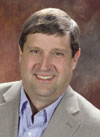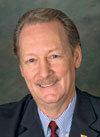 |
|
Bruce Tutvedt-R |
At a recent Kalispell Chamber of Commerce forum, legislative candidates were given a few minutes each to get up and introduce themselves to the gathering. Most offered fairly benign explanations of their political philosophy. But when Mark Holston, Democratic candidate for Senate District 3, took the stage, he unloaded a blistering critique of the compromised ethics he saw as inherent to the campaign of his opponent, Republican Bruce Tutvedt.
 |
|
Mark Holston-D |
Holston’s remarks demonstrate that the race to represent this senate district, which stretches from the northwest part of the county to the area between Evergreen and Columbia Falls, has grown quite heated in its final stretch. The seat is open since Republican Sen. Jerry O’Neil is term limited.
Tutvedt is the owner of a gravel pit on Church Drive that has been embroiled in a long-running court battle with a community group that said his pit violated the West Valley neighborhood plan. He is also a third-generation Flathead farmer who has received hundreds of thousands of dollars in farm subsidy payments from the U.S. Department of Agriculture since the mid-1990s, according to a database compiled by the Environmental Working Group.
After lamenting the partisanship in Montana state government, Holston told the chamber audience that voting for Tutvedt amounts to “electing a representative of a particular industry” – meaning the construction industry – and that it was “absolutely a poor way to do public policy.” Holston also criticized his opponent for espousing Republican policies of low taxes and small government while Tutvedt “benefited from one of the most wasteful government programs.”
“I would question that person’s intellectual honesty,” Holston added.
Answering his opponent’s criticism, Tutvedt, 52, noted that he has not gone negative.
“I’ve handled myself with honor and dignity,” Tutvedt said. “I have run a campaign that has not taken shots at anyone.”
If elected, Tutvedt said he would be a “positive force in the gravel industry and in the construction industry,” adding, “we need to have building and we need to have agriculture in Flathead County.”
As for the criticism regarding USDA subsidies, Tutvedt, who grows wheat, peppermint and cattle, said such payments are part of being a modern farmer, though he added that he has worked with U.S. Sen. Max Baucus, D-Mont., to facilitate free trade deals for Montana agricultural exports.
“The U.S. government, with its cheap food policy, has made the marketplace in agriculture such that the American farmer gets part of their revenue from the marketplace, and part of their revenue from government,” Tutvedt said. “If (Holston) would check the record, he would see I have been a strong proponent of moving toward more market-based and less government support.”
Chairman of the state farm service agency committee, Tutvedt describes himself as a “connector,” involved in banking, construction and agriculture. He touts strong relationships with the Republican leaders in the Senate, and he is focused on making Montana a more competitive state to draw business and create jobs.
With a projected state surplus, Tutvedt said he would like to see the Legislature enact long-term property tax cuts – the chief goal of Republicans in the 2007 session – and give some one-time money back to counties for infrastructure improvements. He does not favor a local option sales tax, saying it would harm county residents in SD3 who would pay the tax when they travel into Kalispell for goods, but wouldn’t enjoy the benefits that residents of the city receive.
Tutvedt would like to eliminate the business equipment tax. Raising the exemption to a level like $250,000, Tutvedt said, is not enough.
“It does nothing for the family farmers of Montana that employ people and produce our food,” he added. “My tractor cost $250,000; what are you going to raise it to?”
On gravel pits, Tutvedt has worked out a rough agreement for the Legislature with the Montana Contractors’ Association and the Department of Environmental Quality where the commercial construction industry will impose a tax on itself that will fund two new full-time DEQ employees to assist in permit reviews. If more staffing is needed, as seems likely, that will have to come out of the general fund.
“We see that as a good compromise to get these permits done,” Tutvedt said.
And on this particular contentious issue, the candidates don’t seem that far off. Holston, 62, believes the Legislature must provide DEQ with the resources to beef up its staffing in order to assess a proposed gravel pit’s impact on air and water, and issue permits through a predictable process.
“DEQ is unprepared for the level of work that they’ve been confronted with,” Holston said. “Here’s a classic example of an agency that is not able to do its job efficiently and thoroughly and in a timely manner, because it is under-funded.”
Raised in Rollins and a veteran of the U.S. Air Force, Holston currently works as a freelance journalist. For 14 years he was the news director of KCFW, and he touts his background as a journalist with giving him the ability to see both sides of an issue. In a district that elected a conservative Republican, Holston believes the growing subdivisions and increasingly suburban nature of SD3 over the last six years give the Democrat a shot this time around. He contrasts himself with Tutvedt by pointing out that none of his votes in the Legislature would be for his own self-interest.
Holston would support legislation that allows communities to vote on whether to enact a local option sales tax.
“It seems fundamental to our democracy that people at the local level should have some say over how and why they are taxed,” Holston said. “It’s bewildering why anybody would deny that right to local citizens.”
He would like to see the Legislature save some of the surplus in a “rainy day fund,” and give some of the funds to communities for infrastructure improvements. The one-time $400 tax rebates that came out of the last session, Holston said, would have been better had they been based on property value. On education, he supports giving more authority to local school boards to use state funding as they see fit.
Regardless of who wins the seat for Senate District 3, the lawmaker will preside over a period of continuing change to a central swath of the Flathead that will bring challenges to Republicans and Democrats alike.